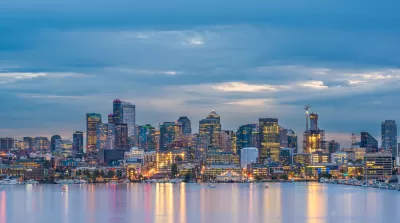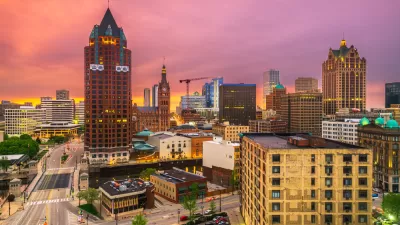Views about urban growth and decline often rely on statistics for metropolitan regions rather than cities proper. Here, Richard Florida looks at the fastest- and slowest-growing cities in America, separate from their metro areas.

When it comes to narratives about coastal superstar cities and a rising Sunbelt, "the reality is that most studies that purport to talk about cities are really talking about the performance of broader metropolitan areas," Richard Florida writes. A focus on cities themselves reveals uneven patterns of urban revitalization, where some are experiencing heady growth while others "continue to struggle and lose ground, whether to other cities or their own suburbs."
For the first of a four-part series, Florida worked with a team of researchers to examine America's 50 largest "core or principal cities" through the lenses of population and employment growth over the years 2012 through 2017.
In terms of population, the narrative of a burgeoning Sunbelt and a declining Frost Belt appears to hold. "However, the most rapidly growing large cities are not sprawling, unregulated Sunbelt ones (such as Houston), but two relatively expensive tech hubs, anchored by leading research universities—Seattle and Austin."
Employment patterns match the narrative of Sunbelt ascent even better, with the list of fastest-growing job markets in cities mirroring the list for metros. For both population and employment growth, "superstar" cities like New York, Los Angeles, and San Francisco rank only average.
FULL STORY: The Fastest-Growing U.S. Cities Aren’t What You Think

Maui's Vacation Rental Debate Turns Ugly
Verbal attacks, misinformation campaigns and fistfights plague a high-stakes debate to convert thousands of vacation rentals into long-term housing.

Planetizen Federal Action Tracker
A weekly monitor of how Trump’s orders and actions are impacting planners and planning in America.

In Urban Planning, AI Prompting Could be the New Design Thinking
Creativity has long been key to great urban design. What if we see AI as our new creative partner?

Pedestrian Deaths Drop, Remain Twice as High as in 2009
Fatalities declined by 4 percent in 2024, but the U.S. is still nowhere close to ‘Vision Zero.’

King County Supportive Housing Program Offers Hope for Unhoused Residents
The county is taking a ‘Housing First’ approach that prioritizes getting people into housing, then offering wraparound supportive services.

Researchers Use AI to Get Clearer Picture of US Housing
Analysts are using artificial intelligence to supercharge their research by allowing them to comb through data faster. Though these AI tools can be error prone, they save time and housing researchers are optimistic about the future.
Urban Design for Planners 1: Software Tools
This six-course series explores essential urban design concepts using open source software and equips planners with the tools they need to participate fully in the urban design process.
Planning for Universal Design
Learn the tools for implementing Universal Design in planning regulations.
planning NEXT
Appalachian Highlands Housing Partners
Mpact (founded as Rail~Volution)
City of Camden Redevelopment Agency
City of Astoria
City of Portland
City of Laramie




























